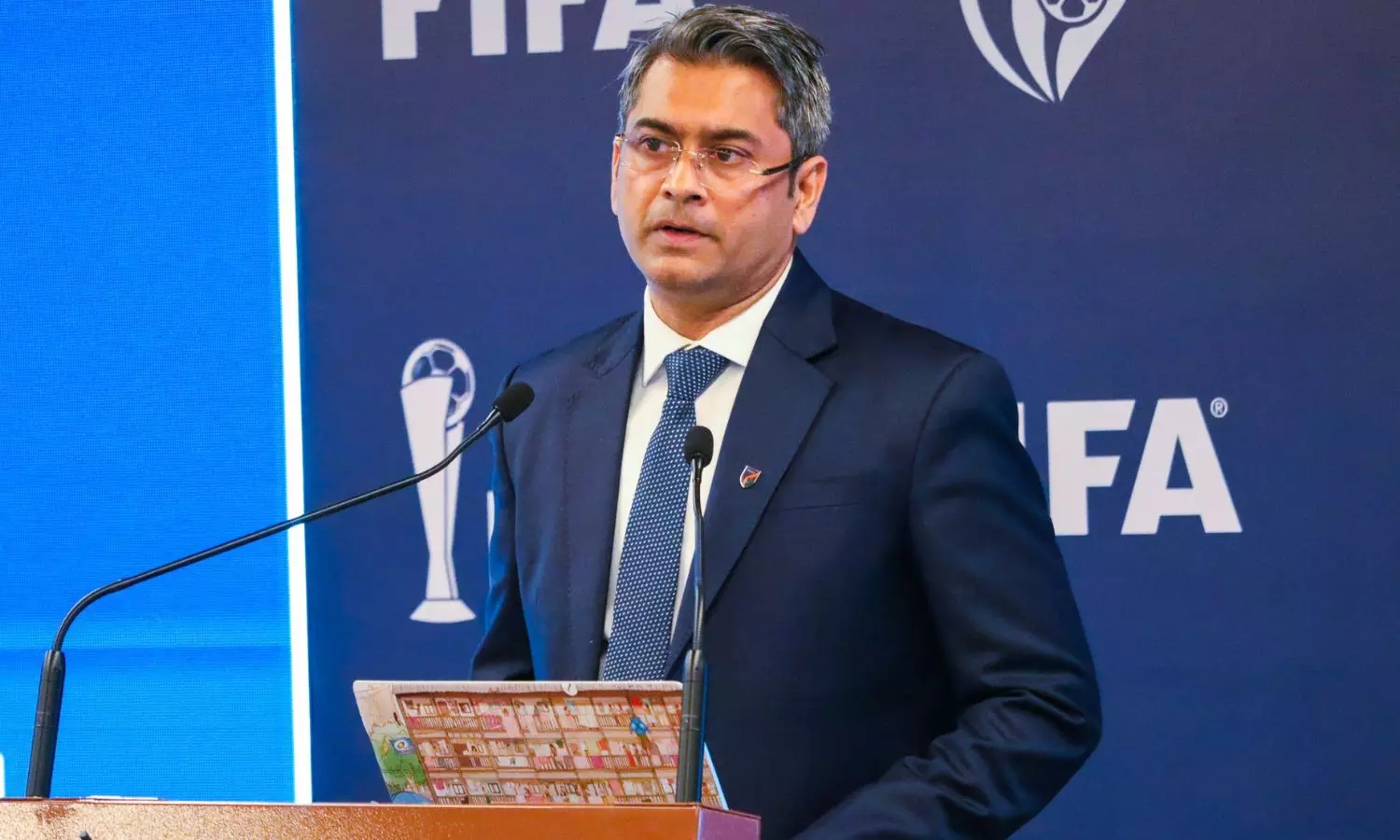Football
Kalyan Chaubey breaks silence on OCI Players, Bhaichung Bhutia row
AIFF President Kalyan Chaubey responds to Bhaichung Bhutia’s allegations, addresses OCI player inclusion, and hints at possible changes for India’s head coach Manolo Marquez.

Kalyan Chaubey became the AIFF president in September 2022. (File Photo)
AIFF President Kalyan Chaubey addressed a range of pressing issues in Indian football during a lengthy press conference on Friday, responding to growing criticism from various stakeholders—including former India captain Bhaichung Bhutia—and offering clarity on the federation’s efforts regarding Overseas Citizens of India (OCI) player eligibility, youth development, and the future of head coach Manolo Marquez.
Recently, Bhutia has launched scathing attacks on the state of Indian football, describing the system as “rotten” in a media interaction with Deccan Herald. Outraged by India's dip in form and lack of vision, Bhutia accused the federation of “destroying the sport,” and called for a structural overhaul of the AIFF.
Chaubey, in a pointed rebuttal, questioned Bhutia’s own role within the federation. “He is a part of the AIFF Executive Committee and has been present at 11 EC meetings,” Chaubey said. “If there was corruption, he had ample opportunity to raise it there. The minutes are recorded and available.”
He further alleged that Bhutia was “playing with the emotions of players and families,” suggesting that the former captain was using his influence to promote his own academy despite its recent struggles, including a 31-0 loss to Minerva Academy. “Being a legendary figure comes with responsibility,” Chaubey remarked. “This isn’t about personalities. It’s about progress.”
Amidst this heated backdrop, Chaubey also sought to update fans on one of the most debated topics in Indian football—whether OCI players could soon be eligible to represent the national team. “We’re in contact with 33 players who are eligible for OCI cards,” he confirmed. “Some have already received them; others are in the process. The AIFF is helping wherever possible. We are in constant dialogue with the government for the necessary approvals.”
Chaubey acknowledged that India lags behind other nations that have successfully integrated naturalised or dual-nationality players into their squads. “Countries ranked below us have used this path,” he noted. “We are trying our best, within our constitutional capacity, to follow a similar route. But until there’s a green light from the administration, we cannot move forward.”
Beyond the politics and personnel, Chaubey offered insight into long-term development plans, including expanding the AIFF-FIFA Academy model from a single batch of 30 boys to five academies producing 150 players, in the hopes of strengthening the U-17, U-20, and U-23 pipelines. He cited recent results by academy players—big wins against clubs like Odisha FC and MBSG—as early signs of promise.
However, Chaubey admitted that systemic issues remain, particularly in Indian striker development. “It’s unrealistic to expect wins if we don’t score goals,” he said, highlighting the ongoing reliance on veteran forward Sunil Chhetri. “Many Indian players are used in supporting roles at their clubs. They cannot suddenly become No. 9s for the national team overnight.”
That shortage of goal-scoring firepower has also cast a shadow over the tenure of new head coach Manolo Marquez. The Spaniard, who succeeded Igor Stimac, has yet to register a win in competitive fixtures, with India falling to a 0-1 loss against Hong Kong and managing only a goalless draw against Bangladesh in recent AFC qualifiers.
Amid growing calls for Marquez’s dismissal, Chaubey remained measured but firm. “Manolo Marquez is a highly rated coach who understands Indian football,” he said. “But I’ve received several queries over the past few days about his future. We’ll decide at the Executive Committee meeting on June 29.”
While the AIFF finds itself at a crossroads—with public trust wavering, stakeholders demanding answers, and fans growing restless—Chaubey maintained that the federation is “planning for 10 years ahead,” not just reacting to current challenges.
“Blaming is the easiest thing to do,” he concluded. “We prefer to show what’s being done—with facts, with numbers.”

